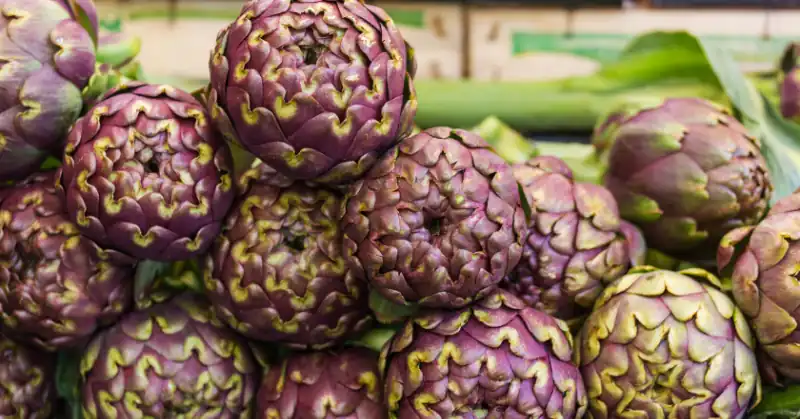Can dogs eat artichokes? Are they safe or too risky for our canine companions? These similar questions arise in pet owners as they are curious about their pet’s dietary needs. Artichokes can offer a minimal range of nutrition for dogs. Like other veggies, they are also safe for canines when given in moderate amounts.
This blog will clarify all your doubts about feeding artichokes to your furry friend. It will also discuss the benefits, risks, and other considerations of artichokes for dogs.
Can Dogs Safely Eat Artichokes?
As a dog owner, your first question is whether dogs can safely eat artichokes. So yes, they can have them in their diet, like other vegetables. Plain and cooked artichokes are safe and healthy for our furry companions, as they are devoid of harmful additives or other ingredients like spices, herbs, or flavorants.
Can dogs eat artichoke hearts? Due to their composition, processed or canned artichokes may cause health issues in dogs. Marketed canned artichokes have varied flavors, additives, or fake ingredients that could lead to obesity, an irregular heartbeat, and similar health issues. Artichokes could be considered a superfood for dogs due to their presence of essential vitamins and minerals.
Remember, it is essential to consult a vet before feeding your dog any new variety of human food. You must know your dog’s nutritional requirements and choose their treats accordingly. Vets can give you tailored advice based on your pet’s health needs.

Read more: Can Dogs Eat Lemon Cake?
Top 4 Benefits of Artichokes for Dogs
There are two types of artichokes. One is Jerusalem artichokes, also known as sunchokes or sunflower artichokes, obtained from the sunflower plant.
These Jerusalem artichokes help create a fibrous environment that thrives for healthy gut flora, which is why they are added to Probiotics for Dogs.
Dogs can also eat Jerusalem in a diet, but we are now mainly discussing non-Jerusalem artichokes.
1. Minerals and Vitamins
When discussing vitamins and minerals in artichokes, many vitamins are present, including Vitamin C, Vitamin K, Potassium, Zinc, Magnesium, Phosphorus, Niacin, Folate, and Folic Acid. These vitamins and minerals are essential for the body’s immune system. They help boost heart health, skin quality, and coat quality.
2. Anti-Oxidants
Artichokes also have antioxidant properties and are good sources for facilitating the immune system. Antioxidants help fight the oxidation caused by free radicals, harmful agents that can damage blood cells, especially red blood cells. They also help reduce the body’s inflammation, ultimately reducing the chances of arthritis pain.
3. Low Cholesterol and Fats
Cholesterol is a slow poison, and artichokes are vegetables that are low in fats and contain zero cholesterol. This property of artichokes helps dogs have good heart health and weight. If you are giving your dog a diet containing cholesterol and fats, add artichokes as an alternative diet to their meal.
4. Prevent Bloating
Artichokes are fiber-rich and suitable for dogs facing constipation and gas problems. These veggies ease digestion and boost the assimilation of digested food in the body, thus reducing bloating and gas issues. They are good for gut health and maintain liver and kidney functions.
5. Natural Sugars
Artichokes are low in calories as they have only natural sugars. They are also considered a low-fat diet and help prevent obesity and hyperlipidemia in canines and humans as well. These properties only exist in natural, plain, or cooked artichokes that do not contain any seasonings or additives.

Besides these benefits of feeding artichokes to dogs, it is crucial to add dog-friendly items to your dog’s dietary regimen. Dogs can also eat globe artichokes in moderation. Moreover, remember that these benefits do not always come true for a dog breed. To make a sound dietary decision, pet owners must consult a vet.
Also read: Is It Safe to Feed Dogs with Tamales?
Possible Risks of Giving Artichokes to Dogs
Everything has some pros and cons, such as artichokes and similar veggies. Apart from the nutritional benefits, a dog owner should be aware of some of the risks associated with artichokes. Dogs with weak immunity and allergies should not eat artichokes. Some of the dangers of feeding artichokes to dogs are mentioned below.
1. Choking Hazard
Artichoke leaves are dense, hard, and tough to swallow, which is critical for small dogs. Artichoke leaves contain cynarin, a compound that can cause digestive issues in dogs if consumed in large amounts.
To prevent blockage in the food pipe, it is suggested that artichokes be served in small, bite-sized pieces. Adult dogs are also used to gulping large pieces and swallowing them all at once. It can also lead to choking, which may become severe enough to require surgical procedures.
2. Blockage of Intestine
As mentioned above, the leaves of artichoke vegetables are difficult to swallow. If the dog has swallowed successfully, this can cause a blockage of the intestinal gut. It will ultimately lead to symptoms, i.e., loss of appetite, abdominal pain, vomiting, nausea, cramps, etc.
3. Elevated Amount of Fiber
Although fiber is good for health, exceeding the limit of anything causes consequences. If your dog ingests a lot of fiber at once, it leads to diarrhea. Maintain your dog’s bowel movements by giving it a healthy diet.
4. Allergic Reactions
Dogs may develop allergies to some components of artichokes. The additives and spices found in canned or processed artichokes irritate dogs and result in symptoms like itchy skin, hair problems, vomiting, etc. It is best to watch out for signs and symptoms while feeding any new food to your pet.
5. Worsening Health Condition
Artichokes might be tasty for humans, but without vet consideration and modification, they can lead to severe digestive risks for your furry friend. Keep them out of reach of your dog to avoid harm. They can worsen your pet’s underlying health problems, lessening the effect of the medicines he takes.
6. Possible Toxicities
Canned or processed artichokes have many harmful seasonings, preservatives, additives, or flavorings. These components can cause severe toxicity in dogs. If not washed properly, your dog may suffer from toxic reactions when fed raw artichokes.

To prevent these health risks, give your furry friend a dog-specific diet. Never add too many artichokes to their plate at once. It may lead to severe health consequences, as mentioned above. Always go with a balanced diet that fulfills your pet’s dietary needs.
How to Serve Artichokes to Dogs Properly?
Can dogs eat artichoke? While artichokes are safe for our canine buddies, you must consult a vet for proper guidelines for feeding this unique human food to dogs. Everything is safe if we follow an appropriate route. There are some experts’ opinions regarding feeding artichokes to dogs.
1. Plain and Cooked Artichokes
Cooked and plain artichokes are safe and sound for our pets. They do not contain hazardous components like fake seasonings, preservatives, artificial flavors, or additives like canned or processed artichokes. The importance of giving cooked artichokes to dogs is to prevent unwanted consequences like GI disturbances, choking risks,
2. Remove Leaves and Spikes
It is best to peel off artichokes’ leaves and hard coverings to prevent choking. These pricky coverings may hurt their mouth and cause injuries.
3. Serve in Bite-sized Pieces
After peeling them properly, cut them into small, bite-sized pieces that are easy for your pet to chew. Serve them in small amounts and seek undesire reactions. Consult your vet if you observe any such responses in your pet.
4. Feed Occasionally
Although artichokes are safe for dogs, adding these vegetables to your pet’s daily eating routine is not good. Excessive fiber content may hurt their GI, as we discussed above. Experts have encouraged pet owners to feed dogs artichokes in moderation. You can use them as a training reward for dogs in small amounts.
5. Watch Out for Allergies
Before feeding any food variety to your pet, you must watch out for allergies or sensitivities. Dogs have sensitive immune systems, and a slight diet change can drastically affect them. Add artichokes slowly to your pet’s eating routine and seek their reactions. If all goes well, you can add more, but remember, artichokes could be unhealthy if you exceed their limits.
6. Consult Your Vet
Vets are specialized in deciding a pet’s eating regimen. They can guide you based on your pet’s dietary needs and underlying health conditions. Vets can give you a list of high-alert diets and one of the healthy nutrients. It is best to seek their advice before enhancing your pet’s eating regimen to maintain their health and strength.

These precautions for feeding artichokes to dogs are essential to remember. These steps can save you and your pet from unwanted health consequences. Always consult your vet or approach online resources or communities to get information regarding the feed you add to your pet’s plate.
5 Dog-Friendly Vet-Recommended Treats
Every individual has a metabolism, which has different requirements and deficiencies. When talking about a dog’s requirements, every breed has a different metabolism, which behaves differently due to deficiencies. It is not necessary to maintain a diet that includes artichokes.
There are several alternatives concerning artichokes that can help your dog grow with nourishment and a healthy lifestyle. Following are some of the healthy vegetables that are safe and also maintain the diet as a substitute for artichoke, mentioned below,
1. Carrots
Carrots are high in fiber and low in calories, making them ideal dog meals. What makes them even better is that they also provide vitamin A and Beta-Carotene.
2. Broccoli
Broccoli contains vitamins C and K, which help dogs regulate blood flow in their bodies, specifically the red blood cells. It is also a source of fiber and antioxidants.
3. Sweet Potatoes
These potatoes are the best source of Dietary Fiber and vitamins A and C. The sweetness of the potatoes increases when they are cooked or boiled. The dog’s diet should be maintained, as exceeding any diet would have serious consequences.
4. Green Seeds
Green beans or seeds are among the best digestive supplements for dogs with GI problems like gas, bloating, indigestion, etc. They are healthy and crunchy veggies for dogs that support their nutrition in raw and cooked forms. They are suitable for dogs with weight issues as they are low in calories and rich in vitamins.
5. Pumpkins
Pumpkins offer a sweet, delicious supplement to a dog’s plate. It aids in digestion and helps regulate bowel movement. Thus, it reduces stomach aches, nausea, and fullness feeling. Pumpkins are an excellent source of vitamins and minerals for dogs. It is crucial to seek a vet’s recommendation before feeding pumpkins to your pet.
6. Spinach
Spinach is packed with iron, vitamins, and calcium. It could be a healthy and safe alternative to artichokes for dogs. Spinach is a nutrient-based and dense superfood. It supports healthy digestion, immunity in the body system, and other factors as well.
7. Carrots
Carrots contain vitamin A and beta-carotene, which makes them an even better option than artichokes. They also have low calories and high fiber content, aiding gut-related problems like gas and bloating.

Not all vegetables are safe for dogs, but safe vegetables should also be managed as their toxicity level can degrade the dog’s immunity system. Some harmful and toxic vegetables, including onions, garlic, avacado, tomatoes, and mushrooms, should not be a part of your dog’s eating regimen.
Consider the above healthy digestive supplements with the vet’s approval to feed your dogs. You can also use them as a training reward. Try dog food puzzle toys to keep up their mental health. They can be a good source of anxiety relief and make your pet relaxed and calm.
How to Prepare Artichokes for Your Furry Friends?
While covering all the aspects of preparing artichokes for your furry friend’s consumption and discussing the guidelines on how often they should be added to dogs’ meals, ensure that the artichokes are free from harmful components and well cooked.
Steps of the Procedure for Preparing the Artichokes
- Fresh artichokes are safe for dogs in small amount. Select the fresh artichokes, which are vibrant green, have tightly closed leaves, and are firm.
- The chosen stem of the artichoke should be trimmed, and about one inch should be left attached.
- Cut about an inch from the top with a sharp knife to remove thorny tips from a stem.
- The outer, tougher part of the leaves can also be removed to make it more convenient for your furry friends.
- Boil the artichokes to soften them. It takes 20-30 minutes for them to become tender and fascinating for your dog. The size of the artichokes affects the time of tenderization.
- Keep artichokes dips away from your pets as they contain garlic and onions, which are almost lethal for canines.

Final Thoughts
Can dogs eat artichokes? How can we give artichokes to dogs safely? Artichokes are safe yet healthy vegetables for dogs in moderation. This blog has discussed artichokes’ benefits, health risks, and precautions. As mentioned earlier, the vet’s consultation regarding a pet’s diet is crucial. Vets are aware of possible allergies or unwanted reactions to a particular diet for dogs. For a more comprehensive study, read more in this blog.
Frequently Asked Questions (FAQs)
Q1. Can dogs eat artichokes in the morning?
A: Artichokes are not harmful to dogs when added to their dietary regimen. Yet, precaution is necessary. If you want to feed your dog artichokes in the morning, ask your vet to keep him sound and safe.
Q2. How many artichokes can a dog have?
A: The exact amount of artichokes needed to maintain a healthy dog diet has not been revealed. To answer this question, you need to visit your vet or connect to online communities where experts share their opinions.
Q3. How do I safely add artichokes to my pet’s plate?
A: While artichokes are safe for canines, you must take caution. You can mix raw artichoke stems with dog-friendly ingredients and safely add them to their diet. For more enhanced guidance, seek a vet’s opinion.
Q4. Can dogs eat artichokes as part of their regular diet?
Artichokes are not harmful to dogs when added to their dietary regimen. Yet, precaution is necessary. If you want to feed your dog artichokes as part of their regular diet, ask your vet to keep him sound and safe.
Q5. Are artichokes a superfood for dogs?
Artichokes are considered a superfood due to their various nutrients and essential minerals. When handled adequately, they have several health benefits. You must consult a pet expert to get the best combo diet of artichokes full of nutritional value for your pet.




